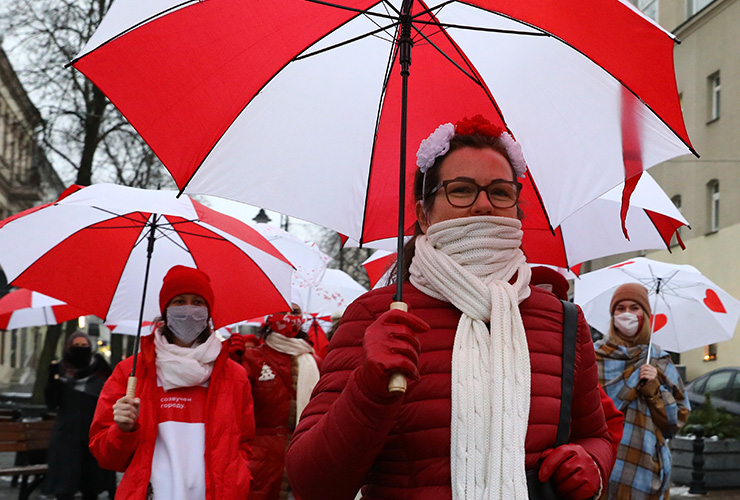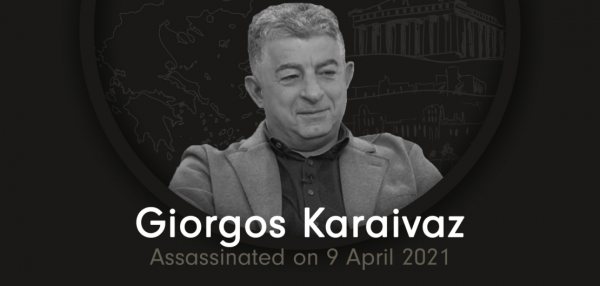The International Press Institute (IPI) today condemned the continued repression of journalists in Belarus and called for the immediate release of the 12 currently imprisoned journalists who have been prosecuted for carrying out their professional duties.
In the latest sign of the continuing crackdown, on the morning of March 22 a journalist working for the Belarusian newspaper Hazeta Slonimskaya, Yazep Palubiatka, was summoned by the police and did not return after interrogation.
Around an hour after Palubiatka entered the police station, officers searched his apartment and seized his computer and mobile phone. Authorities have yet to provide any information about the charges against Palubiatka and he still has not returned home.
This makes him one of 12 journalists currently being held behind bars in Belarus, according to recent reportsby the Belarusian Association of Journalists (BAJ). So far in 2021, the monitoring group has documented eleven journalists who have been arrested by security forces.
The latest arrest is among 51 incidents in which journalists have been judicially prosecuted this year involving apartment searches, confiscated equipment, fines for working without the accreditation they were previously deprived of, according to BAJ monitoring.
Among the recent arrests are that of an investigative reporter of the newspaper Novy Chas, Dzianis Ivashyn, who was detained and had his apartment searched by the Belarusian security service on March 12, as IPI reported previously.
Earlier this month, a reporter for the independent online portal Tut.by, Katsiaryna Barysevich, was sentenced to six months in prison by a Minsk court for publishing medical information about an injured protester that contradicted the official account.
On February 18, Belsat TV journalist Katsyaryna Andreyeva and camerawoman Darya Chultsova were sentenced to two years in prison for reporting on the ongoing anti-government protests.
#Belarus Brilliant professionals and talented journalists Daria Chultsova and Kaciaryna Andreeva have been sentenced to 2 years of imprisonment. In November,they were detained for live streaming from a rally in #Minsk. If no response from the West follows, there will be more pic.twitter.com/dFtH4ugAYt
— Hanna Liubakova (@HannaLiubakova) February 18, 2021
These arrests are among the estimated 289 political prisoners currently being held in Belarus and follow another 480 arrests of journalists and at least 62 cases of physical violence against journalists during the 2020 anti-government protests, as monitored by the BAJ.
“As events over the last few weeks have demonstrated, the Belarusian government and security forces’ coordinated and systematic crackdown on independent journalists and critical voices continues unabated”, IPI Deputy Director Scott Griffen said. “The latest victim of this repression is Yazep Palubiatka, who has been disappeared into police custody without charge. Authorities must immediately make clear his whereabouts and ensure his physical safety.
“It is vital that the international community not lose sight of the massive press freedom and human rights violations in Belarus. Though the mass round ups of journalists from the streets have halted for now, the Lukashenko regime is continuing its campaign of steadily arresting and imprisoning those in the media that dare to strongly criticise the government and alert the world to the widespread abuses by security forces.”
Arrests take place in advance of protests
Detentions of journalists in Belarus are usually followed by court hearings within 24 to 48 hours in which they are often handed short jail sentences. However, after three days, authorities have still not provided information about Palubiatka’s charges.
“The fact that they are holding him for the third day already makes us cautious”, Alina Stefanovich from the Belarusian Journalists Association told IPI. “They started this kind of detention back in August and are trying to keep as much information as possible from being published.”
Stefanovich said the recent arrests may be part of a strategy to keep journalists from covering the expected protests on March 25, the Belarusian Freedom Day. “The authorities are trying to keep people away from the protests by summoning activists to police stations for questioning that day and arresting journalists to prevent them from covering the protests”, she explained.
“The authorities are doing everything they can to scare people”, Stefanovich added. “Journalists will probably try to do their jobs as usual, but we don’t know what will happen.” Media workers have been arrested in the past just for covering the protests, and that could happen again. “I don’t know if many people will come out because the atmosphere here is really scary”, she said.
“The pressure is intense”
“Every day it gets worse and worse. I haven’t read any good news for a long time”, Nasta Reznikava, a journalist working for the independent Belarusian news channel Belsat TV, told IPI. “The pressure is intense. All my colleagues feel the police next to their house, and it’s become much harder to film on the street, which we mostly do with cell phones now.”
Some of her colleagues have previously been arrested for brief camera shoots on the streets, Reznikava said, and activists she interviewed were searched by police in their homes briefly afterwards. At the same time, a lawyer who has defended many journalists in court is expected to lose his license, as have many other lawyers defending activists.
“Some of our colleagues who were previously arrested are currently out of town,” Reznikava said. “Almost all of them were under police surveillance. It was clear that the police wanted to show that they would be arrested if they tried to cover the protests, so they left the city.”
“The rest, like me, stayed”, she said. Given the current threats, she expects several arrests. Nevertheless, she and her colleagues will continue to work on the ground and try to cover the upcoming protests as best they can. “That’s what we have to do, that’s our job”, Reznikava said.
Situation may yet worsen
“The situation for media freedom has never been great in Belarus, but since last year a real war started against journalists”, the Belarusian journalist Hanna Liubakova told IPI. During last year’s mass protests, Liubakova and her colleagues were afraid of being arrested or hit by stun grenades, tear gas or rubber bullets – which in many cases happened.
Currently, those mass protests in the streets have faded, as many people are afraid of consequences. Nevertheless, the discontent is still present and people are still gathering. Yet Liubakova said the format has changed to more locally based protests and the adaptation of new methods,. “They’re still against the illegitimate leader and they will continue in whatever way possible. The crisis is not over, and Lukashenka has to deal with it”.
In response, the government started to react with new methods of repression. “What we see now is that these arrests are targeted and more intentional”, Liubakova explained. “Now the regime wants to destroy local networks of journalists, media outlets, and basically every organization that is active or helps”. Recent cases, such as the searches of press associations or arrests of members, exemplify this development. “They destroy the infrastructure of any organization that is still alive and helps people on the ground”, she explained.
“I think the regime is scared”, Liubakova said, and she expects more upcoming oppressions towards media and protesters. “The more they see that the crisis is not over, the more they want to destroy active communities, stop people from self-organizing and coming out to the streets.”
Given the draft “foreign agents” law, which would prosecute organizations that cooperate with foreign aid, as well as recent cases of blocked websites and media outlets that have been stripped of their media status or deemed extremist, Liubakova fears that worse times may be ahead, in which it will become increasingly difficult to work as a journalist.
Ongoing protests
Press freedom in Belarus was by no means ideal in the past years. Since the protests, however, the situation has deteriorated drastically. Along with journalists, hundreds of protesters have been arrested since August and numerous cases of human rights violations in prisons have been reported.
Protests against the government have been taking place in Belarus since the presidential elections on August 9 last year. The current head of government, Alexander Lukashenko, who has been in power since 1994, is accused of systemic electoral fraud and the opposition, led by Sviatlana Tsikhanouskaya, is calling for his resignation.



